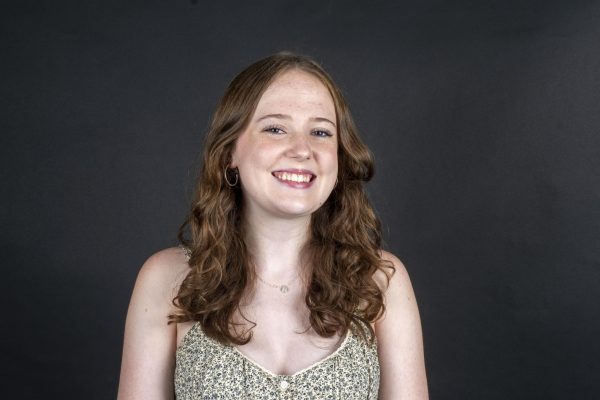RUHS Teacher Features: Durán, Keller and Rodriguez
Teachers Amanda Durán, Amber Keller and Emily Rodriguez share their teaching and classroom philosophies.
AMANDA DURÁN
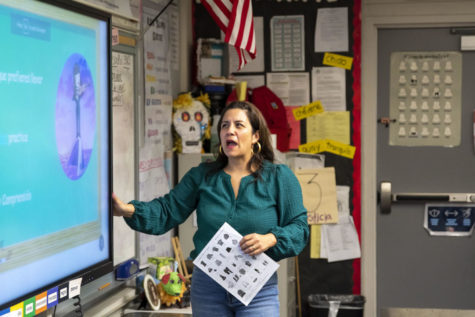
From the first day of walking into Spanish teacher Amanda Durán’s classroom, students can tell that she’s not like every other teacher. Greeted with a smile and personalized hellos, Durán starts her class by making sure each student feels individually welcomed—and with a lot of singing and dancing along the way.
Durán comes from a family of teachers, and 2023 marks her 19th year in the classroom, ten of which spent at RUHS. Following her mother’s footsteps, Durán found her passion for Spanish through her first teaching job at a low-income school in The Bronx, New York.
“What sets me apart from other teachers is definitely my experience. I’ve taught in Manhattan [New York City], Redondo, The Bronx, Santa Monica. I didn’t realize I wanted to be a Spanish teacher until I got to New York and realized through Spanish, I was able to authentically share my culture and life experiences to connect with my students,” Durán said.
By working with kids from all backgrounds—both affluent and poor—Durán was motivated to be a good example and a positive influence for her students who needed support. And thanks to her optimistic outlook, she was able to grow both as a teacher and in her personal life.
“I’m just always trying to be better. I know that I have a lot of faults as a person. But I think that teaching is a job where you’re always learning and developing, and if you’re doing it right, you’re constantly becoming better,” Durán said.
She refers to Room 403 as not only a classroom but a community. In her teaching, Durán ensures all students feel respected by practicing inclusivity, displaying her allyship of different religions, cultures, sexualities and gender identities. For example, she educates on gender-neutral pronouns in Spanish and proudly flies a rainbow flag at her desk.
“My priority is making students feel safe. We don’t only focus on the Spanish language, but also on things like conversational skills and politeness toward all people. And if someone hasn’t learned those things yet, I give them a space to mess up which is a crucial part of the learning process,” Durán said. “I let people know that they are welcome here, and I try to be as inclusive of all people as I can.”
According to Durán, one of her main goals as a teacher is to appeal to students of all different learning styles including people with disabilities, IUPs and 504 plans. Her strategies stray away from traditional teaching, instead incorporating songs to enhance memorization and dances to build physical and mental connections.
“For me, the most helpful thing Señora Durán does in her teaching is the videos and songs she uses to supplement our lessons. With the videos playing in the background while we’re in class, it’s easier to remember certain phrases or vocabulary words in the long run,” freshman Siena Barg said.
Durán makes sure that her positivity shines through her teaching. By practicing mindfulness during class and teaching yoga in the library after school, she encourages students to “make the best of what’s given” to them every day. Every day, Durán intends to share her love and appreciation for school and her culture with all of her students.
“It’s obvious that Señora Durán likes to teach. Some other teachers act like it’s a chore, or they don’t put in that much effort and enthusiasm into their teaching, but with Señora Durán that’s not true,” Barg said.
Freshman Spanish 1 student Robbie Holland appreciates how Durán structures her lessons to be more of a “conversation” than a lecture.
“I like Señora Durán’s teaching style especially because the way she teaches is more energetic and interactive as opposed to other teachers,” Holland said. “She asks a lot of questions to her students, but she’s less focused on getting the correct answer and rather finding out what students’ opinions on the topic are, or what they can share that they already know. It’s more free-form and less pressured.”
Durán’s unique spin on classroom education using positivity and community allows students to form deeper connections with both her as a teacher and the concepts they’re learning. She makes a point to create individual bonds with each of her students, both educationally and personally, and makes it clear that she is not only a Spanish teacher but also someone that her students can come to and confide in.
“I know that a lot of teachers say they don’t care if their students like them. But I do,” Durán said. “I care because I know that if you don’t connect with your teacher, you’re not going to learn from them.”
AMBER KELLER
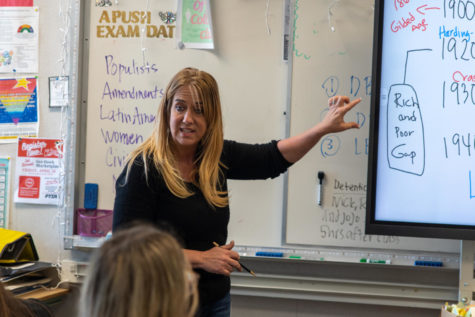
On the top floor of the 800s building, room 827 is buzzing with energy before school, during passing periods, snack, lunch and during the four AP U.S History review sessions after school. AP U.S. History and AVID teacher Amber Keller’s doors are always open, greeting students to host their clubs in her classroom and hang out. Keller has taught history for 17 years and has devoted her life to teaching and fostering relationships with her students, encouraging her students to find their passion for learning.
Keller believes her teaching philosophies have grown and changed since distance learning. She attempts to keep a balance between pressure to do well in her class, yet, is understanding of students’ lives and mental states.
“I want to make [sure] that when students come into my classroom, they know it’s a safe place. I want students to know they can always reach out and not stress about the work if something else is going on.”
However, teaching was not always in Keller’s life plans. Initially wanting to go to college for journalism, she switched when she realized her love for history and desire to relate to students just as she did with some of her favorite teachers growing up.
“In college, I switched from teaching elementary school to teaching history after 9/11. I talked to my grandmother who loves history, and she’d always tell me about everything she had lived through. She told me, ‘You’re living through something you’re going to tell your grandchildren about, so cherish it and understand it,’” Keller said.
Keller makes efforts in connecting with her students and believes “if [she is] spending nine months in the classroom, [she] wants to know her students.”
“If I’m here, I want to enjoy myself during the day. I don’t want to feel like teaching is a job,” Keller said. “It’s my life and I love watching the light come on and watching students learn about a subject and hear them talk about it later.”
Keller also believes that building relationships with her students reflects in their engagement and love for history.
“In order for students to listen to you, they have to trust you. I’m very personable. I tell my students everything that’s going on with my children, and I feel I’ve connected with them on a personal level,” Keller said.
Handing out candy and stimulating conversation between her students, Keller attempts to engage her students through the extensive block periods.
“I always want to have a hook to get kids excited about something. I try to compare our lessons to things that we’re going through today in the world, and getting them to talk about it to their table mates,” Keller said.
Junior APUSH student Michelle Ngo knows that Keller truly looks out for her students, and “makes an effort to make us feel comfortable.”
“At the beginning of the first semester, I wasn’t doing well on my tests, and for me, Mrs. Keller’s teaching style was different. But she went over the tests with me, and it felt like she cared. I can tell she wants her students to succeed,” Ngo said.
Keller believes in enjoying herself and her teaching experience, which develops from listening and learning from her students. During AP test season, Keller puts in an extra four to eight hours a week after school to help students in review sessions.
“I remind myself how lucky I am to be able to put my classroom key in my door, turn it, and walk in and teach,” Keller said. “I don’t think of my job as a job. It’s my life.”
EMILY RODRIGUEZ
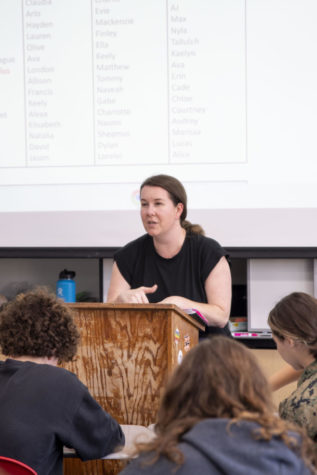
English class often creates an environment where students are scared to share ideas for the worry of being judged. During Emily Rodriguez’s English classes, though, she is persistent in motivating her students to push themselves and encourages them to share their ideas without the fear of judgment.
“Discussion is huge in an English class, and I think it’s getting harder because students sometimes just want to receive material and be tested on pieces of information they have memorized. Sometimes it’s a challenge to get people involved in discussion, but all my favorite classes over the years have been those where people don’t take themselves so seriously and are willing to ask a question and not be so petrified of looking dumb,” Rodriguez said.
Throughout her 16 years as an English teacher, Rodriguez has been able to consistently use her experience to expand and grow her teaching methods. One of those methods is verbal open discussions to encourage students to present their ideas and understanding.
“[To describe my teaching methods], and this is true of any English class, it’s primarily discussion-based because when you read a text, you really do need to hear all of the [other] voices,” Rodriguez said. “My favorite thing about teaching English is that every year a student will make a point that I had never considered before, even though I’ve been teaching for years, and I love hearing the new ideas. I love hearing their stories.”
According to Rodriguez, she focuses on getting her students to pass around thoughts and ideas in discussions because it allows those who don’t share to unconsciously think about literature. This teaches her students different perspectives to help their understanding, according to Rodriguez.
“As writers, they learn several different types of writing, but I hope as thinkers, they get that being a good reader is not about never getting confused,” Rodriguez said. “I think some people are really quick to get to a passage that’s difficult and give up. I hope that my kids walk away knowing that everybody gets confused and it matters more what you do at that point of struggle than whether you’re just a genius and understand everything the first time around.”
Freshman Honors English student Hayden McMahon appreciates Rodriguez’s “calming, stress-free classroom and her chill demeanor.”
“She always has a mug of coffee in her hand and is always so chill, which I really love. Especially as an honors class with more work, I like the fact that she encourages things like time for reading a lot and not constant stress,” McMahon said.
McMahon speaks on how with the workload of an honors class, this calming environment has changed the tone of her year entirely and has encouraged her to be more open.
“It seems like [Rodriguez] likes to let us think of our own things by ourselves and not necessarily have to do exactly what she says every single second. She likes to have us responsible for how much effort we put into the homeworks and practices to grow ourselves,” McMahon said.
According to Rodriguez, she tries to have her teaching go beyond the assigned work. She focuses on inspiring her students to believe in themselves and build more certainty in their opinions. She wants to leave her students with more confidence in their writing and reading abilities than they came in with.
“[My favorite thing about teaching] would have to be the kids. Nobody would teach if they didn’t genuinely like being around teenagers and I love watching my students read this stuff for the first time,” Rodriguez said. “I love watching them wrestle with big ideas and making them feel like their voice matters because I think ultimately, we just want to feel seen and heard. English class is the way that I try to do that for kids. No matter who you are, you have an opinion and it matters. And yeah, I want them to be good writers, but I hope they walk away knowing I care about them as people, not just as a name in the gradebook.”
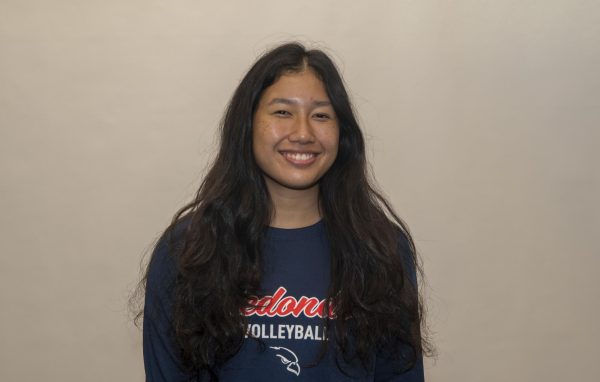
Hi!! I am a senior and I've been a part of High Tide for two years. I appreciate going outdoors and hanging out with my friends. You can find me on page 14 or 15 in the print.
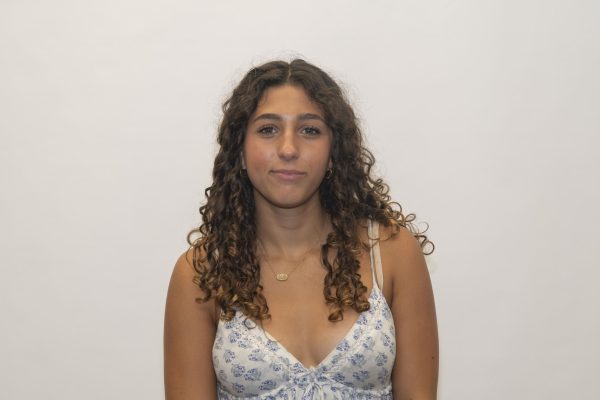
I'm London! This is my second year with High Tide, as a staff writer. I love waterpolo, tube tops, curly hair products, and writing. I'm excited to be writing for the newspaper again this year....



